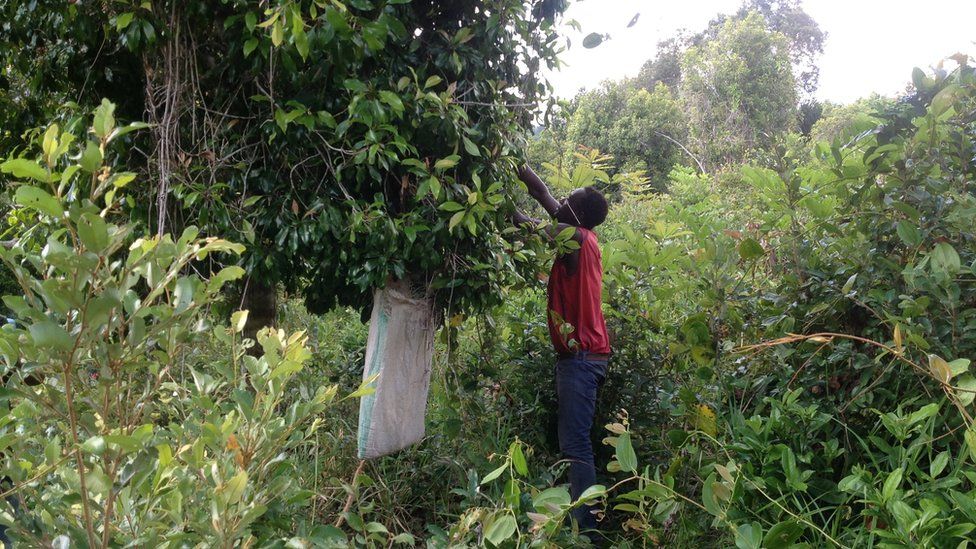CLOVE with its Latin name Eugenia caryophyllata belongs to a tree of the Myrtaceae plant family. Its dried flower buds spread a strong aromatic scent. The tree is native to Indonesia. It belongs to the evergreens and reaches a height ranging from 8-12 m and prefers shadowy places – under tropical suns!
All parts of this pyramidal shaped tree carry essential oils – with the buds yielding the most precious and aromatic ones. The foliage consists of large leaves, and the flowers appear in numerous groups of clusters starting with pale in colour, changing gradually to green and finally into a bright red. This is the time for collecting. Here from a Clove producing company:
„Clove trees are first harvested when the tree is 6-8 years old. The timing of harvest of the Clove buds is critical. The buds should be harvested before the purple or crimson flowers start to develop. The correct time of harvest is when the outer green leaves (the calyx) of the flower bud change from olive green to yellow pink and before the petals fall to expose the stamens.“
https://shikomebiz.com/herbs-and-spices-Cloves/
The English name ‚Clove‘ derives from Latin ‚clavus‘ which means nail, a name evidently given because the buds show a slight resemblance to tiny irregular nails. „Caryophyllata“ stems from ancient Greek c?ryon = a nut + phyllos = leaf. Indeed, Clove, when in flower, has a lot of „nuts“ and leaves on its twigs…. 🙂 After harvest by hand the Clove buds are dried until they turn brown in colour. The essential oil is obtained through steam distillation of the dried buds. 50 kg of Clove buds yield about 1 l of the essential oil.
A bit of history:
Clove is one of the ancient medicinal plants of South-East-Asia, already used in China more than 2 000 years ago – and in Europe already during the late Roman Empire together with Nutmeg and Pepper. Looking back into history one reads that Cloves were outweighed in gold. In the late fifteenth century 1 kg of this highly valuable spice was around 7 g of gold. In the Middle Ages Portugal, Spain and the Netherands dominated the spice trade. Cloves were highly in demand because their intense flavour helped to preserve food. In the beginning of the 17th century the Dutch had succeeded in conquering the monopoly within the spice trade and ruthlessly destroyed all Cloves trees in Indonesia leaving only those on one controlled island. Shortly after this deforestation epidemics appeared due to lack of trees and the disinfectant qualities of the Clove buds. In 1770 France succeeded in cultivating the tree on the island of Mauritius. Subsequently, its cultivation was also developed in Guyana, Brazil, Zanzibar and most of the West Indies.
The densest area where Clove trees are cultivated today is Pemba, an island which together with Zanzibar is part of Tanzania. Clove is omnipresent on Pemba Island with Clove gardens and plantations everywhere. People say that one can smell Clove already from the ship approaching Pemba Island. Also Madagascar is today an important producer of Clove buds and Clove oil.
A great healing potential:
Cloves play an important role as popular incense within Japanese and Chinese culture. All over Asia people love to take incense blends with Clove because, apart from their disinfectant action, they are able to dispel insects and dissolve negative vibrations. During the Tang dynasty in China Cloves were part of the court ceremony; the emperor had his government officials take Cloves in their mouths when approaching him, so to sweeten and disinfect their breath. In our modern times Clove oil is not only used in the perfumery industry, but is part in many commercial mouthwash products due to its anti-inflammatory and disinfectant properties. As to skin care it is – if used in strong dilutions – helpful to treat poorly healing wounds due to its ability of dilating blood vessels and thus helping to absorb haematoma more quickly.
Apart from these benefits Cloves can be praised for their magnificent healing powers. In Ayurvedic, Tibetan and Chinese medicine and after introduction to Europe also in Western herbalism Cloves are an acknowledged remedy to treat dental pains. Eugenol, a major phenol, is the biochemical compound mainly responsible for Clove’s anti-bacterial and mild ant-aesthetic properties. Within dentistry it has proven its qualities when root canal therapy and temporary fillings are required or gum pain needs relief. Putting a Clove laterally into the mouth may help as first aid. Studies on thwarting toxicity in connection with environmental pollutants, digestive cancers and joint inflammation have shown evidence of strengthening the immune system. Those scientific results confirm the ancient knowledge people had since antiquity concerning the beneficial effects of Cloves.
Hildegard von Bingen, the famous German Benedictine abbess and mystic of the 12th century, describes already Cloves as an efficient medicine against gout, swollen intestines, stuffiness in the head, and hiccups. Also safer birth giving was linked to Clove. Midwives, in those times mostly also versed in herbalism, used Cloves to support obstetrics. First to support the birth process itself by making compresses with Clove enriched liquids influencing the uterus to relax. This method also resulted in letting go blocked emotions – so important to allow harmonious breathing and for opening the birth canal. And second it served as an excellent protection for mother and child not to develop inflammations or childbed fever due to Clove functioning as a purifier and detoxifier. Thus it frequently happened that mothers under the experienced care of a midwife safely survived the time of the puerperal whereas those going to a hospital so often died from childbed fever the cause of which was discovered not before the nineteenth century. Interesting to hear is that the Patron Saint of midwives is St. Eugenia hinting at in the Cloves‘ Latin name Eugenia caryophyllata.
Well known also that Paracelsus (1493-1541) created a remedy noted as Laudanum containing Cloves apart from other substances. For centuries it was held in high esteem as a panacea, also considered as a good choice in case of insomnia. Within medicinal culture this blend was used by famous persons like Goethe, Novalis, Edgar Allen Poe and others.
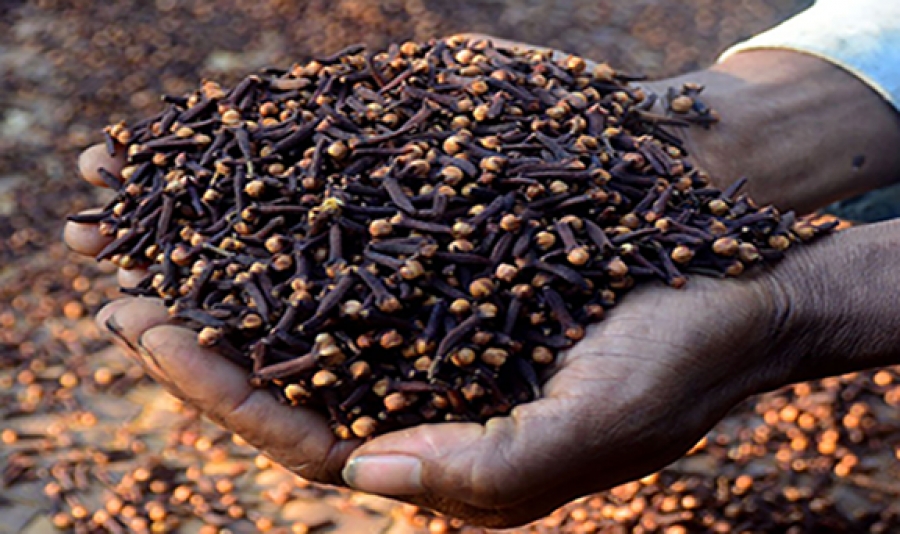
Aromatherapy uses Clove oil if stimulation and warming are required particularly in case if digestive complaints are the problem. When applied over the stomach or abdomen the essential oil unfolds its pain-killing properties. Here it acts as a carminative by allowing the stomach to support peristaltic. A blending of 3 tablespoons carrier oil together with two drops of the essential oil is recommended. Overdoses should be avoided.
On the psychological level the essential oil unfolds relaxing capabilities in case that fixed or obsessive states of mind or undissolved conflicts are the problem. Furthermore it strengthens the nervous system and promotes the ability for forgiveness. Maybe this effect is due to the concentrated sun power hidden in those little buds… Nature loves to keep its most precious secrets concealed in many ways.
One thing is clear: Clove oil, stemming from a tropical plant, has caught a huge amount of the fire element in its energy and bio-chemistry. There is hardly any oil more fiery than Clove bud oil in Aromatherapy. This means: the oil should not to be overused – especially for the „Pitta“ type in Ayurvedic medicine – and in general to be used carefully for any „dosha“ type.
In Ayurveda „Clove can be used in treating a wide variety of ailments with very effective results. It has been known to soothe a cough and sore throat in an instant by simply sucking on a couple of buds… Similarly, it can relieve congestion, asthma, hiccough, and laryngitis just as easily. When taken in herbal formulas such as Mahasudarshana it is used as a powerful anti-microbial, treating everything from bacterial, fungal, viral, and parasitical infections while also removing toxins from the system. When applied externally, it can give great pain relief and alleviate toothache, headache, and joint pain.“
https://svasthaayurveda.com/the-powerful-healing-properties-of-Clove/
It is also clear: A fiery oil is good when we need the fire to increase in our system – be it psychological if we feel worn out, lethargic, unmotivated… or be it physiological when stimulation of the digestive tract for example is needed due to lack of our inner AGNI or digestive fire. Then a quick topical application on the stomach or a light ingestion of 2 -3 drops diluted in a carrier oil or in honey is indicated. The main body organs or energy channels responding best to Clove oil are the digestive, the reproductive, the urinary, the respiratory, and the nervous system.
In Traditional Chinese medicine (TCM) Cloves are linked to YANG energy. Its Chinese name „ding xiang“ is only given to boys and means also „orientation, direction“. Cloves definitely increase the YANG in us and are considered to be connected to the kidneys, the spleen and the stomach. Again here: Clove oil is not advised to serve as medicine for the person who is too fiery but rather for those where the male energy of YANG is not in balance.
Biochemical compounds, ORAC etc.:
Chemical analysis of Clove bud oil shows eugenol, eugenyl acetate, caryophyllene and iso-caryophyllene as its main components with eugenol making up 72-90% of the ingredients. It is the one compound carrying most of the Clove’s aroma. The deeply yellowish brown essential oil spreads a strong savory, spicy, peppery fragrance. The taste can be called highly intense and aromatic.
- Eugenol: 81.93 %
- Eugenyl acetate: 13.40%
- Beta caryophyllene: 3.51%
- Alpha humulene: 0.42%
- Caryophyllene oxide: 0.22 %
- Alpha copaene: traces
What is interesting to see – and quite rare with essential oils – is the density of Clove bud oil. It is higher than water, about 1.04 – 1.07. And this means that the oil will sink to the bottom if you put a drop into a glass of water.
Scientists at Tufts University have developed a measurement scale for the U.S. Department of Agriculture called the ORAC scale (ORAC = Oxygen Radical Absorption Capacity).
The higher the ORAC score, the more capable that particular food is of destroying free radicals. Clove oil is the most powerful free radical scavenger so far known from Nature – a 40 times stronger anti-oxidant than GOJI-BERRIES and nearly 500 times stronger than BLUE-BERRIES. Its ORAC value is over one million= 1.078,700
http://foreverhealthy.net/resources/articles/Clove-oil-the-strongest- natural-antioxidant-known-to-man/
The biochemist Dr. David Stewart calls the phenolic compound group such as the eugenol in Clove bud oil the „Lord of the Rings“, because of their ringlike molecular structure. They are definitely THE anti-microbial agents in Nature.
Molecules with the highest anti-bacterial coefficient are:
- Carvacrol (Oregano, Mountain Savory, Thyme specy)
- Thymol (Thyme)
- Eugenol (Clove bud)
all three are phenols. Cinnamic aldehyde, so strongly present in Cinnamon oil is not a phenol (but related, with a benzenic core). But it has an anti-infectious effect comparable to phenols.
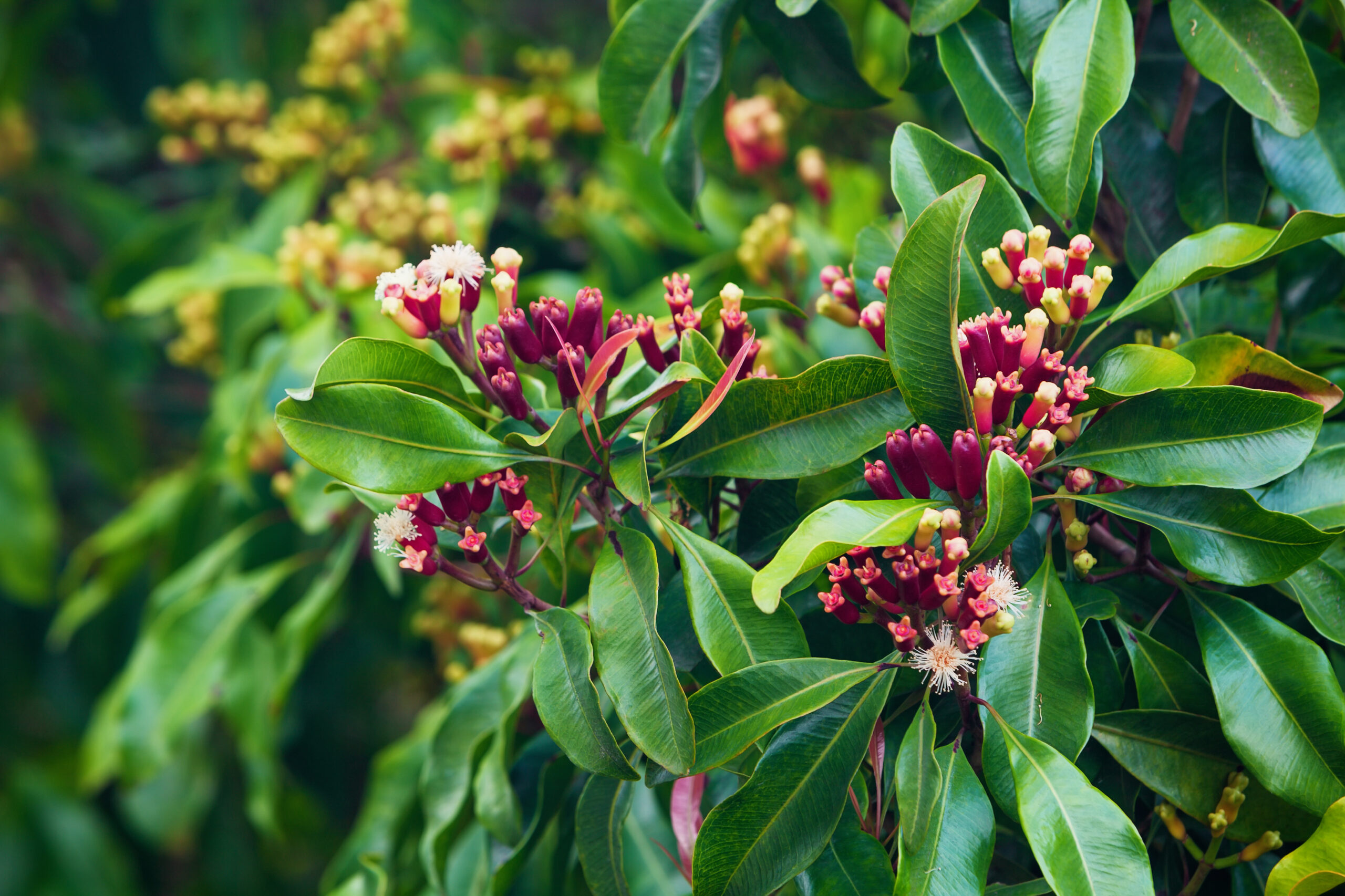
Summarizing the effects of the oil:
Clove bud oil is:
- anti-infectious
- anti-bacterial
- anti-viral
- antifungal
- anti-parasitic
- carminative
- uterine tonic
- powerfully antiseptic
- tonifying and stimulant
- anesthetic
In the aromatogram it shows strong actions as: anti-colibacillary, anti-proteus, anti-enterococcus, anti-streptococcus foecalis, anti-staphylococcus, anti-pneumococcus, and anti-candida albicans
Psychologically Clove bud oil:
- Acts on the heart and on the neuro-vegetative nervous system
- Helps to mobilize physical, mental, and spiritual energy and restores vigour.
The oil should be used in small dosages only. Repeated use can create excitement and nervous exhaustion.
Clove and cancer
Plenty of research on Clove essential oil has been done with regards to its strong anti-cancer benefits. Most of these studies agree that Clove has not only the ability to kill cancer cells, but is highly useful as a chemo-preventive agent.
Clove essential oil has been found to have cytotoxic properties against a line of breast cancer cells. The research group in the USA „The Truth about Cancer“ states:
Clove essential oil:
- Increases apoptosis (programmed cell death)
- Decreases the protein coding gene E2F1 (also known as survivin)
- Inhibits the rapid growth of cancer cells
- Inhibits onco-proteins known to be highly expressed in breast cancer cells and tissues
- Not toxic to normal, healthy cells
- Targets cancer such as breast, colon and esophageal.
„For women with estrogen-receptor positive breast cancer looking for natural anti-estrogen products, Clove essential oil provides one other exciting benefit. A 2012 study revealed that eugenol not only exhibited growth inhibition and promoted apoptosis… but also exhibited an ability to act as an antagonist to estrogen. Researchers found eugenol “to have compounds that have similar or even better affinities to ER than tamoxifen and its metabolites.”
Clove essential oil is not only useful for breast cancer. There are plenty of studies showing its benefits for liver cirrhosis, for colon cancer, and esophageal cancer. Indeed, because of Clove’s anti-inflammatory and antioxidant properties as well as its ability to effectively stop the growth and spread of many cancer cell lines, oil of Cloves shows great promise. Its natural healing properties and anti-cancer benefits will no doubt continue to be studied extensively in years to come.“
https://ne-np.facebook.com/rejuvenateX360/posts/aromatic-exotic-and-cytotoxic-to-cancer-cells-interesting-read-for-users-with-br/776497392940832/
Some recipes:
Viral neuritis, shingles
(Nard)
• Clove: 2 ml
• Peppermint: 2 ml
• Eucalyptus lemon: 1 ml
• Lepstospermum citratum: 1 ml
• Ravintsara:3 ml
• Spike Lavender: 1 ml
Locally, on the inflamed and area, a few drops to 8 times a day or as needed
Skin parasitosis
(D. Baudoux)
• Clove: 1 ml
• Ajowan: 3 ml
• Tea tree: 2 ml
• Thymee thymol: 2 ml
3 drops of the mixture, applied locally to the skin condition – 2 to 3 times a day, for 2 to 3 weeks
Vitiligo (skin depigmentation)
(D. Baudoux)
• Clove: 1 ml
• Bergamot: 3 ml
• Tea tree: 1 ml
• Lemon: 3 ml
2 drops of the mixture on the depigmented spot – 2 times a day, until significant improvement
Amenorrhea – absence of menstruation
(D. Baudoux)
• Clove: 1 ml
• Clary sage: 2 ml
• Sweet Marjoram: 2 ml
• Rosemary verbenone: 1 ml
2 drops of the mixture in a teaspoon of olive oil – 3 times a day, during one week at the presumed date of the period, and 4 drops of the mixture – 3 times a day in local massage in the lower back.
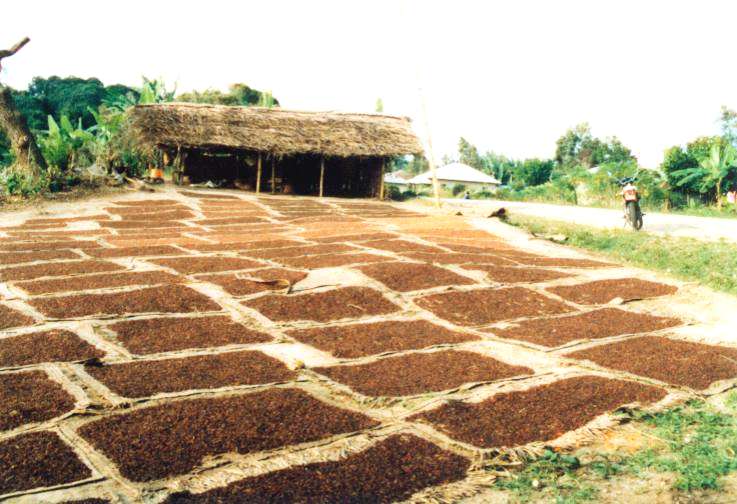
Caries in adults
(Dr Telphon)
• Clove: 1 drop
• Black Pepper: 1 drop
• Nutmeg: 1 drop
On a cotton bud or a piece of cotton, apply directly to the decayed tooth for as long as possible, several times a day
Mouth ulcers, gingivitis, and stomatitis in adults
(Nard)
• Clove: 1 ml
• Noble Laurel: 4 ml
• Thyme Vulgar CT thujanol: 3 ml
• Tea tree: 2 ml
2 to 3 drops locally – 5 times a day
Infectious diarrhea
(Baudoux)
by cutaneous way (in complement of a treatment by oral way)
• Clove:5 ml
• Peppermint: 3 ml
• Tropical Basil: 3 ml
• Cinnamon bark: 0.5 ml
in carrier oil Hazelnut oil: 5 ml
8 drops on the stomach and lower back, every hour, for the first 4 hours, then four applications per day
Migraine
• Clove: 1 drop
• Peppermint:1 drop
• Spike Lavender: 1 drop
• Cajeput: 1 drop
in a carrier oil like sweet Almond oil: 10 to 15 drops
Arnica or St John’s Wort oil: 10 to 15 drops
Gently massage the temples and the back of the neck
Severe immune deficiency:
(D. Baudoux)
No. 1
• Clove: 2 drops
• Ravintsare: 5 drops
• Tee tree: 3 drops
• Frankincense: 1 drop
No. 2
• Mountain Savory: 2 drops
• Niaouli: 3 drops
• Eucalyptus radiata: 5 drops
• Frankincense: 1 drop
No. 3
• Oregano: 2 drops
• Cajeput: 3 drops
• Green Myrtle: 3 drops
• Frankincense: 1 drop
Directions for use: 10 drops of mixture 1 on the chest and 10 drops of mixture 1 on the back 3 times a day for 3 weeks. Stop for one week, and then start again with mixture 2 for 3 weeks. Stop for one week, and then repeat with mixture 3 for 3 weeks. Stop for one week. Repeat the cycle as described above until complete improvement.
cf. http://www.clenama.com/Huiles-essentielles/ft-girofle-clous.htm
Nature Protect Synergy – anti-viral blend – use oils of
• Mountain Savory
• Oregano, moroccan
• Thyme (thymol)
• Thyme (carvacrol)
• Clove bud
• Thyme (linalool)
• Jasmin, grandiflorum abs.
• Petitgrain bigarade
• Basil sanctum (Tulsi)
• Basil canum
Low blood Pressure (Tisserand)
use oils of
• Rosemary borneone
• Spike Lavender
• Clove bud
• Peppermint
• Bay Laurel
1 ml of each in 50 ml hazelnut oil or Jojoba oil
for massage
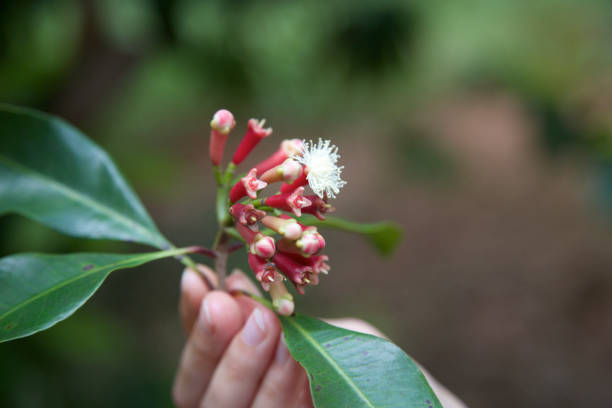
Testimonials:
„Clove oil is great. It’s very strong. Had a major toothache, used Clove oil a few times and no more tooth ache. It seems to have slightly killed the nerve serving the tooth, cause I can eat on the tooth and I don’t feel any pain. This is 100%, don’t use full concentrate, it may burn your skin, gums, and lips. I mix 20/80 or 30/70 Clove to olive oil and apply to tooth with a cotton swab. I swab around the gums and the aching tooth when needed. I used it a few times a day for two days and the severe tooth ache was gone. Use it even if you don’t feel the ache, the Clove oil will penetrate the gums into the root and nerve…“
https://www.amazon.com/NOW-Clove-Oil-Fl-Oz/product-reviews/B0019LRY44?reviewerType=all_reviews
„I love essential oils. I make my own skincare and homemade remedies. Clove oil is definitely one of my go-to oils. I make a massage oil and this ingredient is ‚essential‘. It helps relieve muscle soreness and is very relaxing.“
„Excellent for zapping germs and critters as well as a deodorizer in your laundry. I add a few drops of Clove oil to every load of laundry now and it really helps freshen my clothes and linens. I also add this to my dish soap to zap fungus and germs as well. If you add this to a carrier oil and apply it to a wound it really speeds healing (just don’t use this on cats and other pets as their liver cannot process many essential oils).“
https://www.amazon.com/NOW-Clove-Oil-Fl-Oz/product-reviews/B0019LRY44?reviewerType=all_reviews
Conclusion:
Clove gives us a strong impulse to awaken the warm heart of our innermost being and live from there to the fullest within our daily lives. Clove is truly a medicinal plant with mighty and miraculous activities for the human system – body, mind and spirit. It awakens that energy in us which we need to fire up our dreams, our endeavours, and our actions. With its tropical AGNI energy we have in Clove oil a strong helper against the cooling down of our existential pursuits. And it assists us at the same time to ward off those energies which try to impede us in our intentions and which – at the same time – are the necessary challengers to make us strong in order to progress in our personal and collective research for a better life on our planet – and in our bodily transitory home.
Verily, Nature is not stingy in her offering of countless solutions from the herbal universe so that we may always find a solution for next steps of our evolution on Earth.
